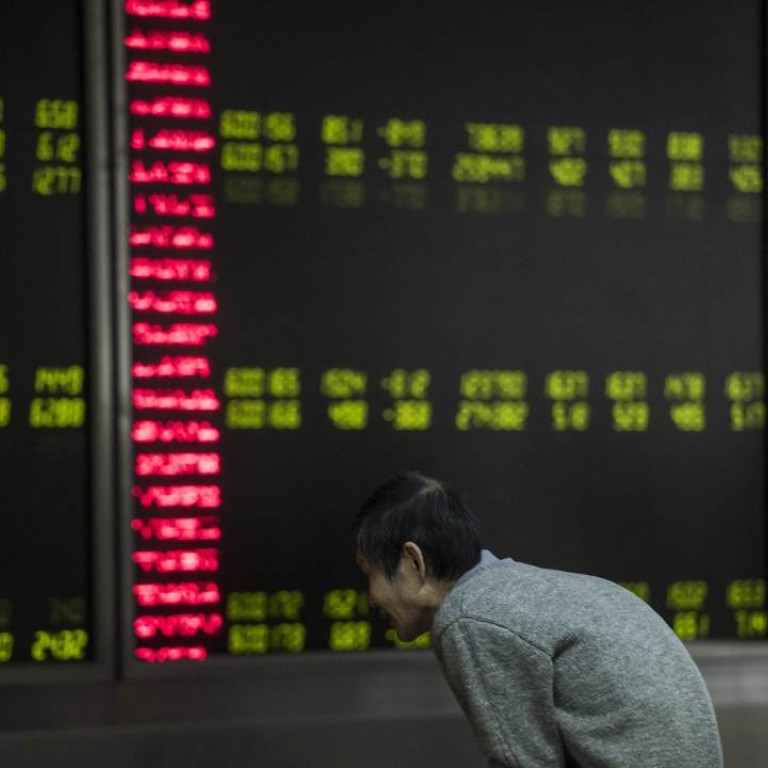
Mainland China stocks post worst February in 15 years as yuan tumbles
Shanghai Composite Index posts 1.8 per cent loss for the month
Mainland China stocks finished sharply lower on Monday, posting their worst February performance since 2001, as the yuan weakened to its lowest level in more than three weeks.
The Shanghai Composite Index declined 2.9 per cent or 79.23 points to close at 2,687.98, the lowest closing level in a month. For February, the index dropped 1.8 per cent, booking a second straight monthly loss.
The Nasdaq-style ChiNext Index plunged 6.7 per cent or 134.77 points to close at 1,880.15, the worst closing level in more than five months. The large-cap CSI 300 fell 2.4 per cent or 70.56 points to end at 2,877.47 and the Shenzhen Composite Index tumbled 5.4 per cent or 93.18 points to 1,643.35.
Hong Kong’s benchmark Hang Seng Index was dragged lower by its mainland counterparts, closing down 1.3 per cent at 19,111.93.
The slide in stock markets came as the People’s Bank of China (PBOC) cut the yuan’s fixing for a fifth day in a row. The yuan’s reference rate against the US dollar was 6.5452, down 114 basis points from its fixing on Friday, marking the biggest fall in nearly two months.
They still worry about the renminbi and whether it can stabilise at this level
Chinese leaders tried to alleviate market concerns at the weekend’s G20 meeting in Shanghai, saying China has no intention of devaluing its currency to support ailing exports and boost the economy
Louis Tse Ming-kwong, director of VC Brokerage, said many investors were skittish amid concerns that the yuan could keep falling.
“They still worry about the renminbi and whether it can stabilise at this level, although the PBOC governor has said there’s not much room for the renminbi to further devalue,” Tse said.
In addition, investors were disappointed at the outcome of the G20 meeting, as they expected the policymakers to be more active in coordinating efforts to spur global economic growth.
“The G20 meeting has good words, but it lacks substantial result, ” analysts from Everbright Securities said in a research note.
Airline stocks suffered steep falls on mainland markets, with investors expecting the depreciating yuan to weigh on the results of airline companies, who have much of their debts denominated in US dollars.
In Shanghai, China Eastern Airlines sank 5.8 per cent to 5.57 yuan, Air China lost 5.1 per cent to 6.15 yuan, and China Southern Airlines fell 4.9 per cent to 5.86 yuan.
In Hong Kong, China Southern Airlines tumbled 3.3 per cent to HK$4.35, while Air China and China Eastern Airlines both dropped 3 per cent, closing at HK$4.61 and HK$3.62 respectively.
Analysts expect the volatility to continue ahead of the National People’s Congress (NPC) meeting beginning this week.
Ivan Li, an equities analyst at Tung Shing Securities, said the mainland markets are always volatile ahead of the country’s two key annual meetings. The NPC meeting, where deputies will discuss national policies for the year and where growth forecasts are set to be released, will begin on Saturday. The annual meeting of the Chinese People’s Political Consultative Conference will open on Thursday.
“Lots of people are expecting some sort of a policy change,” Li said. “The A-share market has been very volatile these days.”
With additional reporting by Enoch Yiu


